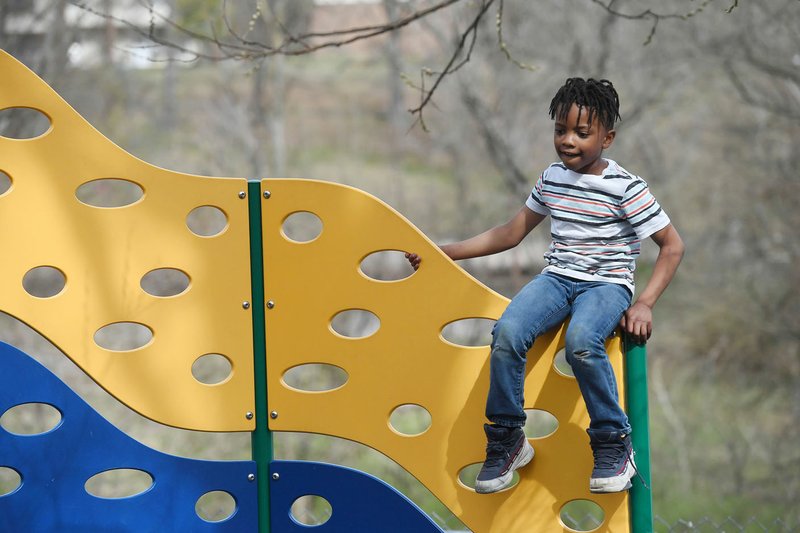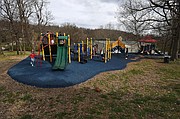FAYETTEVILLE -- The projects in the city's bond referendum are vital to maintain the quality of life in the face of rapid population growth, and the youth of today will benefit most, supporters say.
Early voting starts Tuesday at the Clerk's Office in the Washington County Courthouse. Residents can vote early on weekdays until April 9. Voters will have the option to cast a ballot at any of the six polling sites open on Election Day.
The issues
Voters will decide if they want to continue the city’s 1-cent sales tax to pay for about $226 million in bonds for various projects. The questions as they will appear on the ballot are below:
• Refinance outstanding bonds: $12.2 million
• Street improvements: $73.9 million
• Trails: $6.9 million
• Drainage: $15.8 million
• Parks: $26.4 million
• Economic development: $3.2 million
• City facilities: $3.2 million
• Cultural arts corridor and parking downtown: $31.7 million
• Police headquarters and equipment: $37 million
• Fire stations and equipment: $15.8 million
Source: Staff report
Early voting
Voting for the city’s bond referendum begins Tuesday. Election Day is April 9.
When: 8 a.m.-4:30 p.m. Tuesday through Friday, and April 8
Where: Washington County Clerk’s Office, Suite 300, 280 N. College Ave.
Source: Washington County Election Commission
Passage of all 10 measures would allow the city to issue bonds totaling more than $226 million to pay for various projects using sales-tax revenue. The city already has a 1-cent sales tax on the books, so the projects would be paid for without a tax increase.
However, some voters oppose the nature of sales taxes altogether, saying they unfairly burden the pockets of the poorest residents.
Voters approved the city's most recent bond package in 2006, authorizing $110 million in projects. It had four questions, resulting in a one-fourth percent sales tax increase and an extension of the three-fourths percent sewer sales tax voters approved in 2001.
Money from the 2006 bond referendum went toward the College Avenue bridge, the arterial street loop around the city known as the Mayor's Box, improvements to College Avenue between Maple and North streets, the intersection at Old Wire and Mission Boulevard, restoring the Maple Street and Lafayette Street historic bridges and other projects.
The sales tax rate in the city is 9.75 percent. The city's portion of that is 2 percent, with Washington County at 1.25 percent and the state at 6.5 percent. An additional 2 percent hotel, motel and restaurant tax also is collected to pay for parks and tourism.
One penny of the city's portion is the tax voters are being asked to continue. It generated about $22.3 million last year and is projected to generate about $22.6 million this year, Chief Financial Officer Paul Becker said.
Sixty percent of the other penny goes into the city's general fund for operations. The other 40 percent goes into the ongoing capital fund for various projects.
The 10 measures will appear separately on the ballot. Projects cover roads and trails, parks, flooding, renovation to public buildings, new police and fire stations, economic development and creating an arts corridor and parking structure downtown. The first question to pay off the old debt and authorize the new bonds has to pass for any of the others to pass.
Altogether, the projects will take years to complete. Mayor Lioneld Jordan said the residents who will benefit the most are the young people. The bond issues touch just about every aspect of city life, he said.
"If we don't do this bond for anything else, let's do it for the kids," Jordan said. "For the next generation. It's for our children and our children's children. We owe that to them."
A resident-led campaign urging voters to support the entire bond referendum, called 10 for Fay, has raised $23,250, according to its March filing with the Arkansas Ethics Commission. Mailers have gone out, and a stump event was held Thursday at the Walton Arts Center.
George Shelton, a local political consultant behind the 10 for Fay campaign, said he's seen largely positive responses from residents. Shelton worked on the Fayetteville Public Library's successful millage campaign and the winning campaigns of Jordan and State Rep. Nicole Clowney, D-Fayetteville.
"We really want to try to educate as many people as possible why these 10 initiatives are so important for Fayetteville," he said. "We are very fortunate that a number of people making both small and large donations have come on board and been willing to help us do that."
Another way?
Clint Schnekloth, pastor at Good Shepherd Lutheran Church, said he plans to vote against all 10 measures. No formal group opposing the bond referendum has filed with the Ethics Commission.
Schnekloth said at the most basic level he opposes using sales tax revenue to pay for city projects. He described the tax as regressive, putting the most burden on the poorest people.
It may only be a penny on the dollar, but pennies matter to some people, Schnekloth said. Property taxes would be a less regressive way to pay for infrastructure needs such as roads and drainage, he said.
Contributions from the city's wealthiest residents could pay for some of the other measures, such as the arts corridor, Schnekloth said.
"The flashy ones, the ones that are nice -- I think the 10 richest people living in Fayetteville should just pay for them outright," he said. "I mean I'm joking by phrasing it that way, but that's really the way a lot of great parks are built everywhere."
Schnekloth also said he recognizes the need for some measures but opposes others. He would support the transportation, drainage and fire items if paid for in some other way. He said he opposes building new police buildings because he feels the same people disproportionately burdened with a sales tax typically get the most attention from police.
Schnekloth said he's adamantly opposed to using public money to foster private investments, which is an aspect of the economic development bond issue. He also said he feels the arts corridor would cater to a certain class of people, rather than serve the most marginalized communities in the city.
It's time for a fresh start on the way the city pays for major projects, Schnekloth said.
"We've had this burden for a while now -- this is a renewal of what's already been taxing people here for years -- and I would like to see a conclusion to that," he said.
Becker agreed the nature of sales tax is regressive. However, it's the only way the state allows cities to generate the millions needed for major projects, he said.
Property taxes for cities are capped at 5 mills. Becker estimated that equates to about $8 million annually. Other sources of revenue include turnbacks from the state, fees and fines.
It's an issue the state Legislature needs to address, Becker said.
"We are a high-growth area," he said. "You can't generate the infrastructure you need in any other manner but sales taxes. And your people are only going to have an appetite for sales taxes costing so high."
Laying the groundwork
Shelton said most residents he has encountered who oppose a certain bond measure usually support others. Someone not keen on the arts corridor idea can see the need to fix flooding, for example.
"We had anticipated there would be more people who were anti-change or anti-tax," he said. "We haven't talked with everyone, but the vast majority of people we've talked with are either entirely supportive or are going to show up and vote for all of the initiatives except the one they don't like."
The 10 for Fay campaign anticipates sending out more mailers and has volunteers working the phones to call residents. Ads are also part of the plan.
Support for all 10 bond issues has received endorsements from the police and fire unions, Fayetteville Youth Baseball, Chamber of Commerce, Walton Arts Center Council, Dickson Street Merchants Association, TheatreSquared and the library's Board of Trustees.
Jordan said he thinks about when he first took office in 2009. The city had $128 million in bond debt at the time. All but $12 million is left to go, which the first bond issue would take care of.
The administration is building off the foundation of past administrations, Jordan said. He said he wants to lay the groundwork for future administrations through passage of all the bond issues.
The projects in the bond referendum represent the culmination of years of city plans and the public input that helped shape those plans, Jordan said. If only some or none of the bond issues pass, Jordan said the city will deal with the hand it is dealt.
"I've gone as far as I can go," he said. "I feel like I've done my part, and I've given it all I can. Now it's up to the people."
NW News on 03/31/2019


